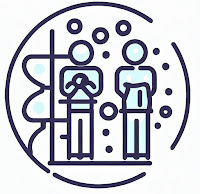 |
| Image created by Bing Image Creator with the following prompt: Create an icon for a blog article on research colleagues |
This summer I had the chance to work on an interdisciplinary research team for a Presidential Grant at Tarleton State. Communication and criminal justice faculty and graduate students dove into a study on AI and group texting implications. The study is interesting and I'll talk more about it later, but one huge advantage to this process struck me yesterday.
On a Zoom debrief, I watched as our two graduate students developed into researchers and colleagues over the summer. They conducted interviews with our majors about ChatGPT and GroupMe perceptions and through the process, they created a tight network to accomplish their goals.
I left the Zoom smiling because our grad students had become colleagues and researchers. One is a doctoral student in Criminal Justice and the other a master's student in Communication Studies. I am so proud of their progress and thankful for the reminder that much of graduate school consists of the experiences and the connections made through those experiences. I find so much joy from working with colleagues (like Dr. Dobbs and Dr. Wang on this project) and was thankful our students found connections, too!
Pursuing grants and faculty-student interdisciplinary projects are engines for so much that is valuable... the faculty-faculty connections, faculty-student connections, socialization of the research process for our students (READ: real projects have bumps along the way), student-student connections, research output, future grant possibilities, etc. This is a gentle reminder to self that the time necessary to organize and apply for these experiences is WORTH it!
Here is the project abstract: In this project, an interdisciplinary team will use a mixed-methods research design to investigate student perceptions, motivations, and justifications for cheating and cyberbullying via technology. Specifically, the researchers will use surveys and interviews to learn more about how students view and use group texting platforms like GroupMe and artificial intelligence aids like ChatGPT. This pilot study begins a line of inquiry and hopes to expand data collection from multiple institutions, as well as create a faculty companion survey about their perceptions. Findings will be used to inform professors and universities about these emerging online phenomena and begin to build best practices, professional development sessions, and policy recommendations. The research will expand the body of knowledge to newer technologies, collective academic dishonesty, and artificial intelligence. This project will build upon both communication and criminal justice theories and conclude with discussions on practical and theoretical implications.
And I'll update as we have more to share!
This project is funded by the Tarleton State University President’s Excellence in Research Scholars initiative.